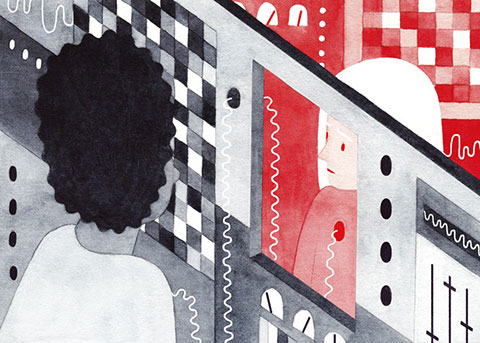Prejudices and moral condemnation might be products of the human brain, but they can manifest in many other parts of the body. When a person comes face to face with someone they find disagreeable, their heart may beat faster. Their skin may conduct electricity better because their sweat glands are more active, which correlates with feelings of fear, nervousness and anger.
For social psychologists such as Elizabeth Page-Gould, these and other bodily reactions can provide new insight into how people respond to uncomfortable social situations, and also point toward new ways to foster healthy interactions among diverse people.
“We’re interested in how we can successfully navigate social interactions in diverse societies,” says Page-Gould. “I’m interested in psycho-physiology because it involves uncontrollable responses.” Such responses provide insight into reactions people might not even realize they’re having.
Because so many factors can shape any interaction – everything from cultural context to how someone slept the night before – Page-Gould’s lab takes extra care to design experiments that other researchers can replicate and test. Her team makes a point of working with large sample sizes, and provides data to other researchers, which helps ensure transparency and verifiability.
One experiment involves pairs of people who disagree on a contentious issue such as abortion or gay marriage. Each person is stationed in an adjacent booth in the lab. They’re wired with biometric recorders while they answer survey questions on a computer. Once they are settled in, a door opens between the two booths, and they must engage in formal debate on their particular bone of contention.
“We use a structured debate to prevent a dominant personality from taking over,” says Jennifer Stellar, a post-doctoral fellow working in Page-Gould’s lab. “It also allows us to get better physio readings when each participant spends part of the time just listening.” When the debate is over, the participants must collaborate on a task, which allows researchers to see if the heightened physiological responses continue through less contentious forms of interaction.
These kinds of experiments get at how people interact with those who are ethnically, ethically or culturally different from themselves. Page-Gould is working to determine how such variations affect human biology, and what human biology can reveal about how to improve relations.
“In Jennifer’s experiment, we’re matching people who differ in opinions they view either as moral issues or personal preferences,” Page-Gould says. The researchers hypothesize that moral issues will spark a stronger physiological response than matters of mere personal choice.
In other experiments, Page-Gould also collects physiological and self-reported data from participants over days and weeks as they go about their everyday lives. Some participants do a survey many times a day for several weeks, reporting on whom they’ve interacted with, along with their reactions and feelings.
This multi-pronged approach helps paint a complete, credible picture of what Page-Gould calls the “messy” world of social interactions – and it has yielded some definitive insights. She’s found that prejudice, for instance, tends to manifest as bias against a specific group, rather than as generalized xenophobia. In addition, those who come into the lab with the strongest prejudicial feelings also turn out to be the people who benefit the most from interacting with members of the groups they are biased against.
“The ultimate focus of my research is on friendship between people of different groups,” she says. “If highly prejudiced people have positive or even just conflict-free interactions with people from other groups, those are the people who then begin to seek out more interaction. Over time, each interaction becomes less of a thing.”
Recent Posts
For Greener Buildings, We Need to Rethink How We Construct Them
To meet its pledge to be carbon neutral by 2050, Canada needs to cut emissions from the construction industry. Architecture prof Kelly Doran has ideas
U of T’s 197th Birthday Quiz
Test your knowledge of all things U of T in honour of the university’s 197th anniversary on March 15!
Are Cold Plunges Good for You?
Research suggests they are, in three ways





